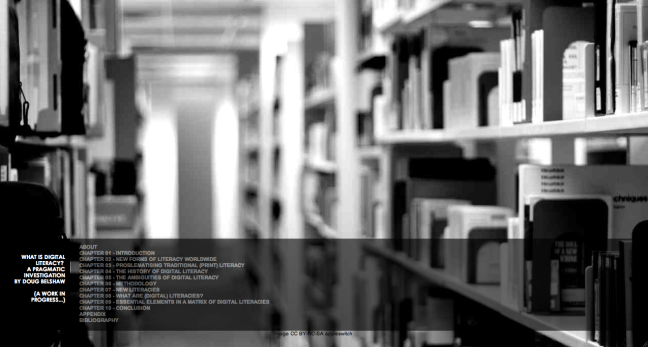
I’m excited to announce that I’ve decided to start writing another e-book. I want to communicate what I’ve learned during my doctoral studies in a way free from academic constraints. I want to empower educators.
The e-book is going to be called The Essential Elements of Digital Literacies and I shall be employing the OpenBeta publishing model I pioneered a couple of years ago with #uppingyourgame: a practical guide to personal productivity.
Invest now for £1 and get each chapter as it is completed FREE!
[flickr video=6812571831 show_info=true secret=fbea45d553 w=650 h=434]
Can’t see anything above? Click here!
What are ‘digital literacies’? Why are they important? How can I develop them both personally and in other people? These are some of the questions that ‘The Essential Elements of Digital Literacies by Doug Belshaw seeks to address. Informed by his doctoral thesis and experience as an educator, ‘The Essential Elements of Digital Literacies’ Doug is producing a timely resource for those who are interested in both the theory and the practice of digital literacies!
FAQ:
When are you going to finish this?
It depends on many things, but here’s my proposed timescale:
- v0.2 – April 2012
- v0.4 – June 2012
- v0.6 – August 2012
- v0.8 – October 2012
- v1.0 – December 2012
I’m erring on the conservative side here. I’d rather under-promise and over-deliver!
In what formats will the book be available?
The OpenBeta version will be available in iPad-friendly (and reasonably Kindle-friendly) PDF format. The finished version will be available in the following forms:
- PDF
- Kindle
- ePub
- (Paperback/Hardback depending on demand)
How much will the final version be?
£10 – around $15/16 at the current exchange rate
(this is subject to change without notice)
I still don’t understand the OpenBeta process?
More here, but this should help:

How long will the book be altogether?
I’m envisaging each chapter being about 1,000 words, so about 11,000 in total. This is subject to change when I start writing but it will be at least 10,000 words.
Are there any refunds? How do I know you will complete it?
No refunds, but I have managed to write several e-books before and have much more free time now I have completed my thesis! You can always wait until it’s finished, but that will cost more…
Image in book cover CC BY { pranav }
Got a different question? Ask it in the comments below!



